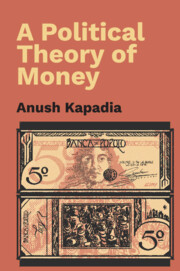6 - There Is No Such Thing as Fiat Money
Published online by Cambridge University Press: 14 September 2023
Summary
Sovereignty is misconstrued by Chartalism. A state theory of money implies a theory of politics, yet Chartalism lacks one. The politics of money, as we have seen, operates at two levels: the broad ‘social contract’ and the granular, institutional instantiation of the political settlement.
While both are missing from mainstream Chartalism, Ingham addresses the latter. While his Weberian or conflictual account of politics is central to his theory, Ingham ultimately downgrades politics to datum, something that sits oddly with his invocation of Weber. This ambiguous position omits legitimacy as foundational to states, provincialises capitalist money despite its technical superiority and world-historical dominance and ignores the material nature of the state's survival constraint.
Having learned so much from Ingham, we presume to invert him in this chapter. His contingent datum we read as universal—namely the conflictual politics that define the ontology of all institutions including money. This gives us a richer account of sovereignty and supplies the missing explanation of variety and hierarchy in money.
Clearly, the state has a central role in monies both past and present, but nailing down the exact nature of the state's role in money has been a troublesome task. This chapter seeks to do this through a critique of the State Theory of Money as outlined by Ingham. A ‘state’ theory of money necessitates at least an outline of a theory of politics: this distinguishes a political theory of money from a state theory of money. Again, we see politics operating at two levels: the agglomerative level of the ‘social contract’ and the institutional level instantiating a particular political settlement.
While both these understandings of politics are missing in Chartalism, Ingham is extremely attentive to the second understanding, showing how the rise of capitalism in early modern England was precipitated by a balance of power between capital and state forces leading to a new, hybrid form of sovereignty and a consequent mutualisation of public and private credit. He therefore has an account of politics only to suppress it as contingent history rather than fundamental logic. Ingham suppresses or downgrades his Weber-inspired conflictual account of politics, we argue, in order to foreground the salience of coercive power in the establishment of money as a unit of account, itself a move in his case against the neoclassical position.
- Type
- Chapter
- Information
- A Political Theory of Money , pp. 104 - 125Publisher: Cambridge University PressPrint publication year: 2024



